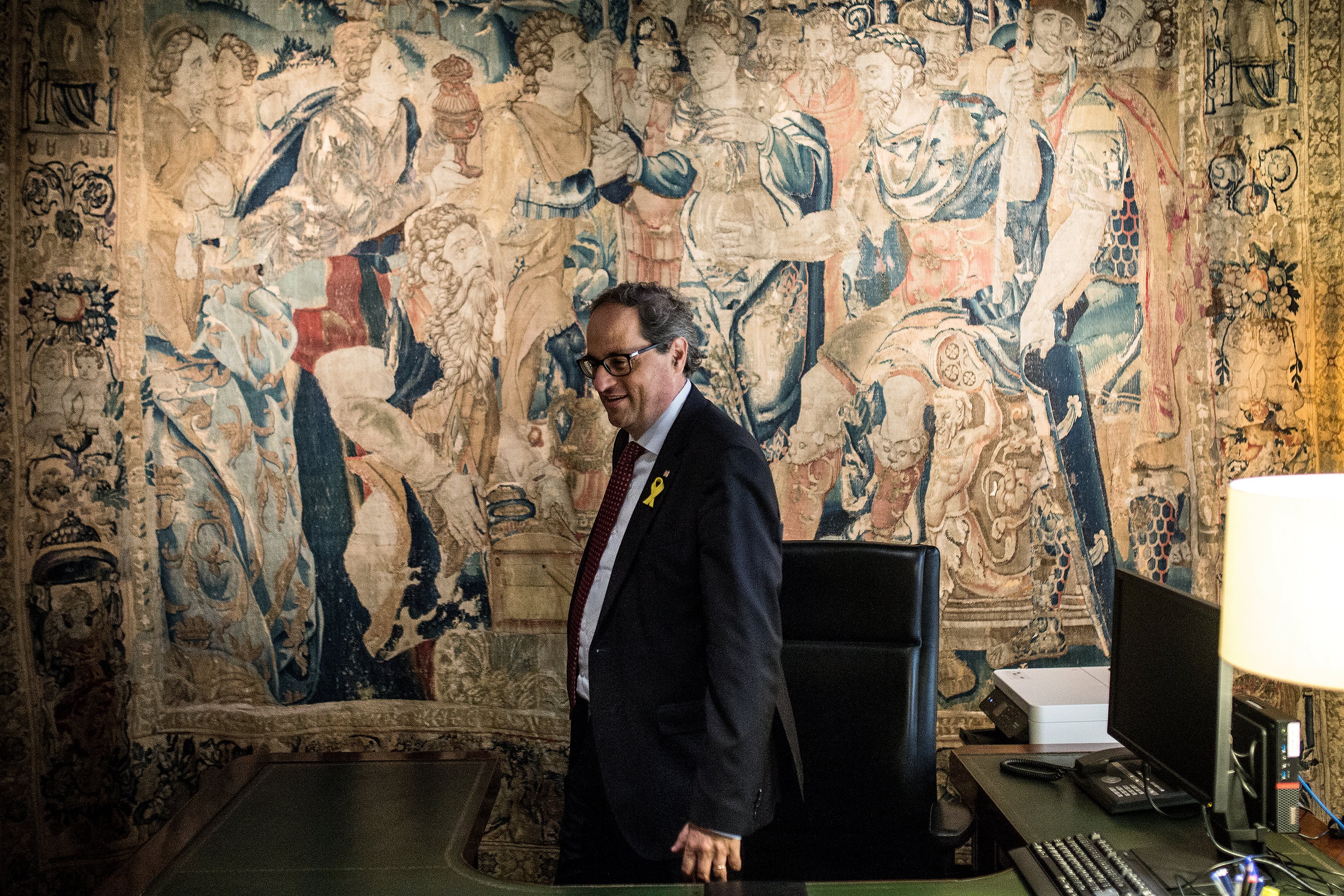The day that Quim Torra entered the Palau de la Generalitat for the first time as Catalan president he had three very specific requests in his head. On that very first day he asked to climb up to the bell tower of the Catalan government palace to read the inscriptions on the bell. It is a bell that dates from 1760, when Catalonia's own government institutions had been abolished after military defeat by the Spain of Felipe V, and the Palau, the seat of Catalonia's government, had then been converted into the Barcelona home of Spain's Real Audiencia - the Royal Audience court. "That artisan, commissioned by the Audiència to forge the bell, put the inscription of the Audiència on it, but afterwards, he added something else: the cross of Sant Jordi - the patron saint of Catalonia. It was as though he was saying: we're not beaten yet", explains Torra.
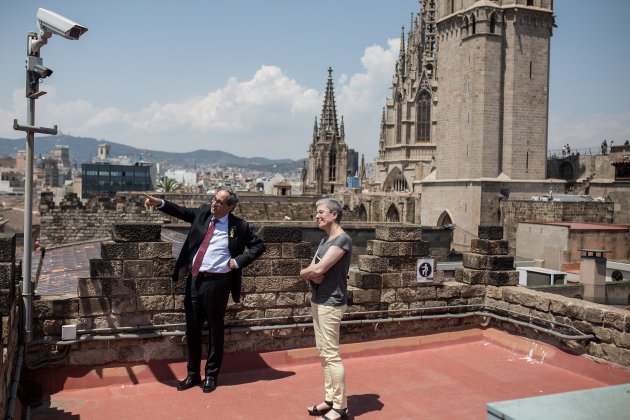
After confirming the bell maker's 18th century gesture of disobedience with his own eyes, that same first day Torra wanted to know how to get out onto the Generalitat's balcony - the balcony looking over Plaça Sant Jaume from where Francesc Macià proclaimed the Catalan Republic in 1931, and where on 6th October 1934 Lluís Companys proclaimed the Catalan State. He asked to see the balcony and "to know who had the keys", as he himself explains it, with irony and a sarcastic smile, remembering the surprised reaction of the Generalitat official to whom he put his unusual request.
The president's third request was to see the famous secret passages which apparently make it possible to leave the building undergound. Torra was able to see that today these accesses are used for such prosaic functions as cabling and that, moreover, the exits are walled up.
With his three first objectives attained and his curiosity satisfied, the two months that Torra has now completed as Catalan president have allowed this passionate lover of history, to explore almost every corner of the Palau, from the rooftop to the backrooms of the original Gothic building, and moreover, to do so in a way that he would not have imagined - as the head of the Catalan executive. On Tuesday, the president showed El Nacional some of these spaces which have become the everyday setting of his presidency.
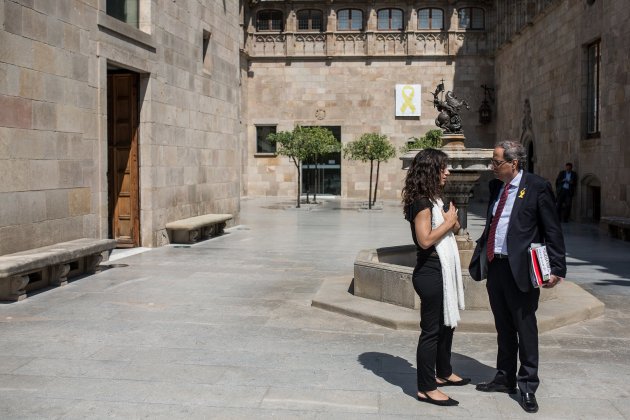
After the controversy about whether or not he would occupy Carles Puigdemont's office, the president set up his work space in the wing on the right of the Palau's central orange tree courtyard. This decision has allowed him to have his closest collaborators working in adjoining spaces. Right beside Torra's office, is that of his cabinet secretary, Josep Rius, who filled the same role for Puigdemont. On the other side, the coordinator of information management, journalist Pere Cardús, one of the first persons he invited to join his team after being nominated. He also appointed Anna Figuera, a journalist specialised in political information, during the first days, to become head of communication; and he put the coordination of international policy in the hands of historian Josep Lluís Alay ― who was with Carles Puigdemont when he was detained in Germany and who last Friday became responsible for the ex-president's office in Barcelona. This group has become the tight core, the president's most trusted team members. In front of Torra's office, behind a big glass wall, is the president's secretary, Anna Gutiérrez, who was also in the same function under Puigdemont.
Since Torra assumed the presidency, the number of fronts he has had to face has done nothing but grow ―the latest, just before this interview, was the backlash he was receiving from the pro-independence CDR groups for being too moderate in his meeting with Spanish prime ministser Pedro Sánchez. If the unionist Catalan opposition showed no mercy against the president from the first moment of his presidency, when old tweets and articles he had written began to be surface left, right and centre, Torra has also had other contentions closer to home: with his pro-independence allies in the Republican Left (ERC), due to a parliamentary relationship which has not returned to full confidence since 30th January, when the speaker, ERC's Roger Torrent, suspended the parliamentary session to invest Puigdemont as president; and he has even had to confront a lack of trust from the PDeCAT (Catalan European Democratic Party), which is caught up in both its own internal fights and a permanent rivalry with JxCat (Together for Catalonia) which is now starting to send out sparks.
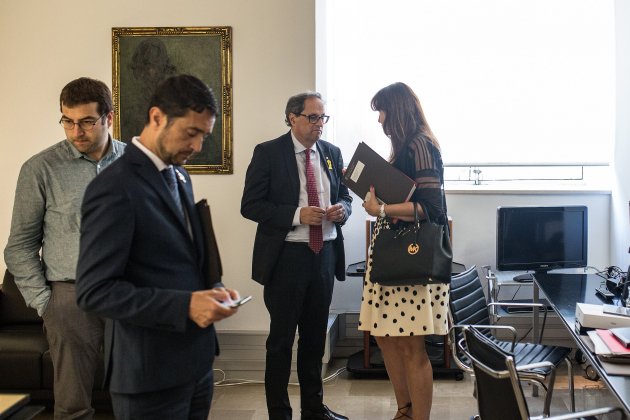
It is with them that he meets "when he needs to look in the mirror", in the words of one of his closest collaborators. They are all also part of the core that is most faithful to Puigdemont, those who said no to abandoning his restoration until the very last moment. And in fact they still say no. On the door of the office that they shared in Parliament, the members of the War Room hung an image of Winston Churchill with the famous "We will never surrender" quote which the British prime minister gave to the House of Commons in June 1940.
Due to their current responsibilities in the government and Parliament, all of this group ended up accompanying Torra on his recent official trip to Washington DC at the end of June and were with him when a high-tension incident occurred with Spain's US ambassador, Pedro Morenés.
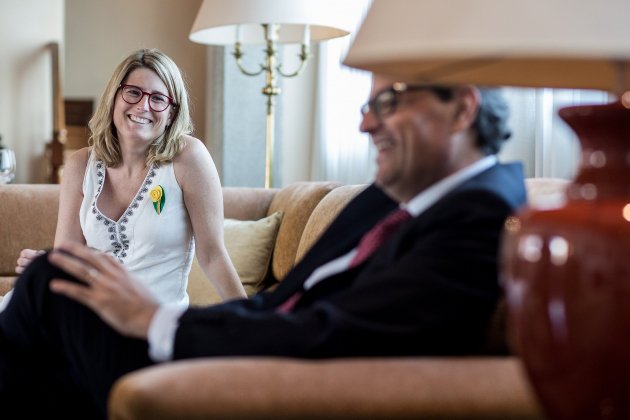
Within the Catalan government, presidency minister Elsa Artadi is Torra's key figure of maximum confidence. The two have daily meetings and constant contact. On Tuesdays, they breakfast together before the weekly cabinet meeting and also meet with Víctor Cullell, secretary of government, before going to the cabinet session.
To facilitate relations with ERC, the president has established fluid dialogue with vice president Pere Aragonès. The two share the same cordial approach, which facilitates day to day matters, although it does not hide the difficulties just under the surface which appear constantly - for example, on the occasion of the letter imprisoned ERC leader Oriol Junqueras wrote to party faithful during the party's national conference in June, in which Junqueras gave a warning about "exclusionary nationalisms".
The president and the vice president have lunch every Tuesday, if they can, in the Generalitat's adjoining Casa dels Canonges. But they don't dine alone. They are usually accompanied by presidency minister Artadi as well as the holder of the justice portfolio, Esther Capella.
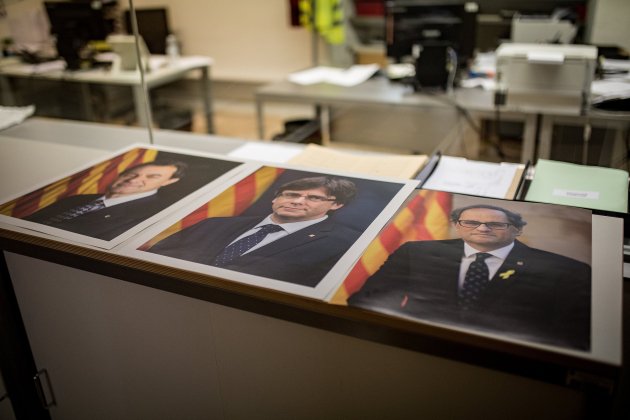
The presence of Carles Puigdemont is intense in the Palau in spite of the distance and the difficulty ―and the criticisms that these have provoked. However, the fact that Puigdemont has not been able to move to Waterloo till now, pending the resolution of his case by German justice, has prevented the launch of the planned Council of the Republic, which has made the situation more difficult and has caused confusion in the division of roles. It is however Torra himself who gives constant reminders on the exceptional circumstances that have led him to the presidency, and who defends the role of Puigdemont.
"I am would be making a huge mistake if I didn't discuss all that we're doing with Puigdemont. We are working for his return", says Torra. And he even confesses that Puigdemont's return is an image he has visualised very specifically. "I imagine president Puigdemont entering a Plaça Sant Jaume that is completely packed, and myself receiving him in the Palau. That's my dream."
"I imagine a Barcelona absolutely full of people, a million people, and president Puigdemont entering a Plaça Sant Jaume that is completely packed, and myself receiving him in the Palau. That scene – I dreamt it. That scene would mean a lot, wouldn't it?"
In fact, during these two months the president has dedicated part of his agenda to visiting those imprisoned or exiled, with journeys which began the very day after he assumed the presidency, including travel to Berlin, Brussels and Scotland - where he also visited first minister Nicola Sturgeon―, as well as to the prisons: first those in Madrid, and now those in Catalonia.
All of this has not stopped him from having time to close the chapter of relations with the Spanish monarchy. The closure was in the form of a door-slam, marking a clear break in the relationship with king Felipe VI as a result of the notorious speech the monarch gave two days after the 1st October referendum. The scene for the break-off was the stormy opening ceremony of the Mediterranean Games; prior to the ceremony Torra announced that the Catalan government would not invite king Felipe VI to its acts and nor would it take part in acts held by the monarch.
"In the second meeting [with Pedro Sánchez], we do have to go further than this, we do have to have tangible actions on the table in the next meeting… we’ve got August in the middle, and we’ve got a busy autumn, starting as usual with the 11th September, then 1st October, which will undoubtedly be very important for the whole country, both for those who were at the schools and those who weren’t, and then some political trials which are also a collective challenge we will be facing as a country."
In the president's close circle, there is an awareness of the fact that the lack of a road map is making it more complex to explain his decision-making. For this reason, the speech that Torra plans to give in September is now anticipated to be a key date in the calendar. As well, there is his next planned meeting with Spanish PM Sánchez, which could occur as early as September, for which Torra demands - this time - tangible results: "the next meeting will have to go further", he told El Nacional. And also ahead is the commemoration of the 1st October, which can be expected to become institutionalized as a new date in the Catalan political calendar. Also due in the autumn is the convention to launch the new political movement which he is promoting jointly with Puigdemont, to give continuity to the transversal JxCat candidature.
These two months have allowed Torra to come fully to grips with the extraordinary complexity of the political stage he is facing; to discover the degree to which parts of his daily life can be suddenly relegated due to the complexity of a presidential role from which he can never really switch off; and to see how statements that in the past might have been ignored can now set off a veritable fire storm. And as well, these two months have allowed a president who is passionate about history to explore every last corner of the Palau.

